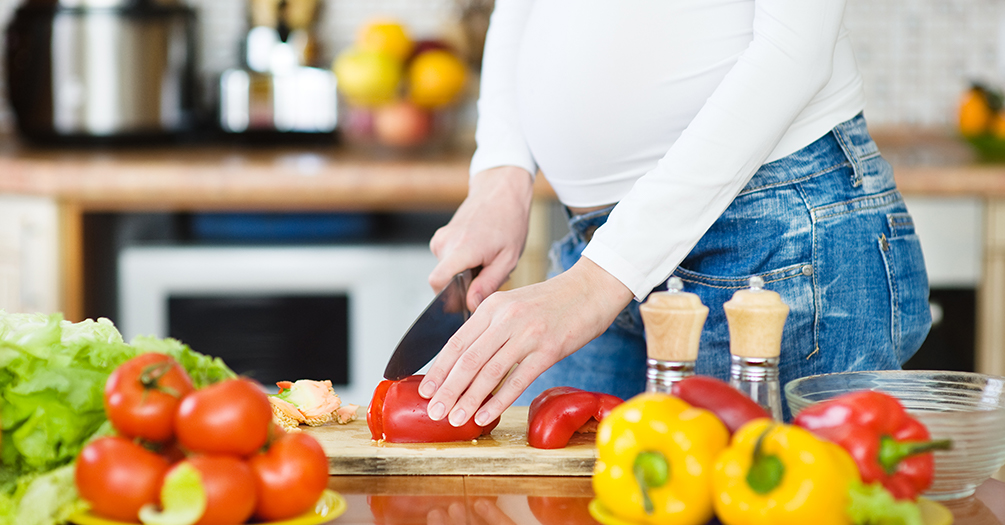Is It Safe to Eat Plant-Based While Pregnant?

Elizabeth Baldwin
Master’s Student, Online Population and Health Sciences Degree Program
Between 2019 and 2020, the US experienced a 27% increase in retail sales of plant-based foods, which demonstrates the growing popularity of plant-based diets. Eating plant-based is often called being vegetarian or vegan ̶ following a diet consisting of reducing or eliminating the consumption of animal products1. But what if you are eating plant-based and you become pregnant? Should you switch back to eating animal products? According to research, the answer is no. When done correctly, a plant-based diet is perfectly healthy during all life stages, including pregnancy, lactation, infancy, and childhood2. However, it requires a strong awareness of key nutrients to ensure a balanced intake that supports both the mother and the development of her baby3. When in need of a quick resource, mothers can refer to the NIH’s Health Tips for Pregnant Women to find out about these important nutrients and which plant-based foods can help them meet their dietary needs4.
Is the Omnivore Diet Healthier During Pregnancy?
It’s not necessarily healthier to eat an omnivorous diet during pregnancy than a vegetarian or vegan diet. A 2015 research team looked at the diet quality of omnivores, vegetarians, and vegans in Switzerland and determined that there were some vitamin and mineral deficiencies in all diet groups. Because of this, the researchers argued that it was not possible to identify one diet as “most beneficial” for human health5. That same year, a separate research team published their findings after they set out to review the literature on vegan-vegetarian diets and pregnancy outcomes. While the study identified that pregnant women who eat plant-based may be at a higher risk for vitamin B12 and iron deficiencies, no significant evidence was found for an increase in severe adverse outcomes. The conclusions of both articles emphasized the importance of nutrient awareness, no matter what kind of diet a person chooses6.
Which Nutrients Are Important?
Those on vegetarian or vegan diets are at risk of having lower amounts of some nutrients like protein, iron, folate, iodine, vitamin B12, calcium, zinc, vitamin D, and omega-3 fatty acids7. In order to avoid deficiencies in these nutrients, a pregnant mother can choose to take supplements such as a pre-natal multi-vitamin, plant-based protein powders, and fish-free DHA. However, most of these nutrients can be obtained by consuming a variety of foods, such as the ones listed below:
Nutritents |
Common Plant-Based Sources |
| Protein | Beans, nuts, seeds, nut butters, lentils, peas, chickpeas, quinoa, and tofu |
| Iron | Soybeans, lentils, spinach, molasses, prunes, and raisins |
|
Folic Acid |
Green leafy vegetables, beans, peas, lentils, wheat germ, bananas, and avocados |
| Iodine | Iodized salt |
| Vitamin B12 | Soy milk, tofu, nutritional yeast |
| Calcium | Soybeans, navy beans, quinoa, mushrooms, and nuts |
| Zinc | Beans, chickpeas, lentils, seeds, oats, and quinoa |
| Vitamin D | Fortified orange juice and plant milk |
| Omega-3 Fatty Acids | Walnuts, soybeans, canola oil, and tofu |
Source: [2] Baroni, Luciana, et al.
How Can You Make Sure to Keep Your Nutrients on Track?
A plant-based diet must be diverse. Foods to incorporate into a vegetarian’s daily meals are beans, berries, fruits, cruciferous vegetables, dark leafy greens, vegetables, nuts, seeds, and whole grains8. Daily supplements, like those mentioned above, will ensure that your nutrient goals are met.
As always, it is important to talk to your doctor about your diet and maintaining a healthy pregnancy, do your research, eat a variety of food, take your supplements as recommended, and rest easy knowing that awareness and action are the best ways to ensure you and baby are happy and healthy!
References
[1] Craig, Winston J., et al. “The Safe and Effective Use of Plant-Based Diets with Guidelines for Health Professionals.” Nutrients, vol. 13, no. 11, Nov. 2021, p. 4144, https://doi.org/10.3390/nu13114144.
[2] Baroni, Luciana, et al. “Vegan Nutrition for Mothers and Children: Practical Tools for Healthcare Providers.” Nutrients, vol. 11, no. 1, Dec. 2018, p. 5, https://doi.org/10.3390/nu11010005.
[3] Sebastiani, Giorgia, et al. “The Effects of Vegetarian and Vegan Diet during Pregnancy on the Health of Mothers and Offspring.” Nutrients, vol. 11, no. 3, Mar. 2019, p. 557, https://doi.org/10.3390/nu11030557.
[4] “Health Tips for Pregnant Women | NIDDK.” National Institute of Diabetes and Digestive and Kidney Diseases, 2019, www.niddk.nih.gov/health-information/weight-management/healthy-eating-physical-activity-for-life/health-tips-for-pregnant-women#eatingPregnant.
[5] Schüpbach, R., et al. “Micronutrient Status and Intake in Omnivores, Vegetarians and Vegans in Switzerland.” European Journal of Nutrition, vol. 56, no. 1, Oct. 2015, pp. 283–93, https://doi.org/10.1007/s00394-015-1079-7.
[6] Piccoli, G. B., et al. “Vegan-Vegetarian Diets in Pregnancy: Danger or Panacea? A Systematic Narrative Review.” BJOG : An International Journal of Obstetrics and Gynaecology, vol. 122, no. 5, 2015, pp. 623–33, https://doi.org/10.1111/1471-0528.13280.
[7] “Staying Healthy on a Vegetarian Diet during Pregnancy.” Journal of Midwifery & Women’s Health, vol. 65, no. 2, Mar. 2020, pp. 291–92, https://doi.org/10.1111/jmwh.13105.
[8] Mayo Clinic Staff. “Vegetarian diet: How to get the best nutrition”. Mayo Clinic website, Aug 2020. https://www.mayoclinic.org/healthy-lifestyle/nutrition-and-healthy-eating/in-depth/vegetarian-diet/art-20046446.
About the Author
 Elizabeth (Liz) Baldwin is a graduate student in the online MPH in Population and
Health Sciences program at the University of Michigan School of Public Health. Her
research interests include food security, maternal and child health, and homelessness
prevention. Upon graduation, Elizabeth hopes to work in the field of public health
nutrition with the idea of eventually starting her own non-profit organization.
Elizabeth (Liz) Baldwin is a graduate student in the online MPH in Population and
Health Sciences program at the University of Michigan School of Public Health. Her
research interests include food security, maternal and child health, and homelessness
prevention. Upon graduation, Elizabeth hopes to work in the field of public health
nutrition with the idea of eventually starting her own non-profit organization.
